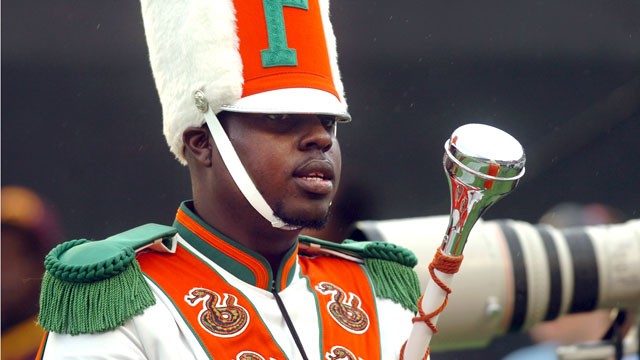
On November 19, 2011, Robert Champion, a 26-year-old drum major from Florida A&M University’s marching band, was beaten to death while being hazed by his band-mates. Now over a year later, Champion’s tragic story is coming back to the limelight and the swath of foot-trampled and sun-baked grass that hosted the nationally regarded Marching 100’s band practices remains bound to tragedy. On Monday, prosecutors on the case announced that the 12 band members charged last May with felony hazing are now facing more serious charges of manslaughter. Here are the fast five facts you need to know:
1. Robert Champion was Violently Beaten to Death.
The beating took place on a bus parked in a hotel parking lot after FAMU played their annual rivalry football game with Bethune-Cookman. Authorities confirmed that Champion had bruises on his chest, shoulders and back. The cause of death was internal bleeding due to blunt-forced trauma. Medical examiner ruled Champion’s death as a homicide Witnesses told EMTs that Champion was vomiting before he was found unresponsive on the bus. Champion, along with other hazed band-members, were forced to run from the front to the back of a charter bus while being beaten. In written statements, band members explained that the hazing was ” a long running hazing ritual that you had to go through to be accepted.” They added that Champion willingly went through the process. There has been prominent speculation that Champion may have been brutally targeted because he opposed the routine hazing or possibly because he was openly gay. Now the 12 band members involved in the beating are facing counts of manslaughter.
2. FAMU Took a Major Hit

Florida A&M University
Not only did the then president of FAMU, James Ammon decide to step down after Champion’s death but University enrollment has decreased by 1,000 students causing a financial loss of 60 million dollars. Champion’s death has also greatly effected the future of FAMU’s well-known marching band which performed at the Grammy’s, presidential inaugurations and Super Bowls as well as represented the US in Paris at the 200th anniversary of the French revolution. As stated by the Washington Post:
Dreams of playing in the now-disgraced Marching 100 band used to draw students to apply to the university as much if not more than the school’s academic program, and the same professional performances that led it to play at Super Bowls and presidential inaugurations were a huge attendance draw at football games.
3. Champion’s Parents Sued the University

Robert and Pamela Champion added FAMU to a lawsuit that already targeted the bus driver. In the lawsuit, Champion’s parents, allege that “[The] FAMU Board of Trustees negligently failed to properly supervise, train, discipline and control the FAMU band,”. In other words, Champion’s parents believed University Officials should have done more to stop the tradition. Just prior the trip, band director Julian White, had suspended 30- band members suspected of hazing. According to the Champion family’s attorney since FAMU is a state institution, Florida law required the Champion family to wait at least six months before taking legal action against the school.
4. Hazing Was A Regular Tradition and a Way To Gain Respect

Charter bus where Robert Champion was beaten
Hazing, although illegal under Florida law, is persistent at the school. Marching 100 members say that its hazing ranges from mild harassment to outright physical abuse. The toughest test? “Crossing Bus C”. Anytime the band would travel to an away game, the percussionist would take the third bus where hazing was known to take place. Former student Royal Sheperd described it as “hell on wheels”. Champion’s friends say that the 26 year old percussionist went through the hazing in part to earn respect from other people. Kean Hollis, a close Champion friend said:
I feel like, like me, he probably thought, if i do the bus, I’m going to get more respect from my band members.” Champion, who had a senior in the band, apparently struggled to get team members’
5. Champion Was Not The First Victim
Just three weeks before Champions death, an incident left freshman Bria Hunter hospitalized with a crack femur, blood clots and deep bone bruising, three students were arrested.